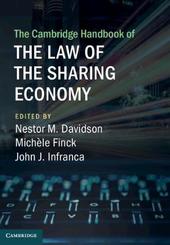
|
The Cambridge Handbook of the Law of the Sharing Economy
Hardback
Main Details
| Title |
The Cambridge Handbook of the Law of the Sharing Economy
|
| Authors and Contributors |
Edited by Nestor M. Davidson
|
|
Edited by Miche le Finck
|
|
Edited by John J. Infranca
|
| Series | Cambridge Law Handbooks |
|---|
| Physical Properties |
| Format:Hardback | | Pages:516 | | Dimensions(mm): Height 262,Width 186 |
|
| Category/Genre | Business innovation |
|---|
| ISBN/Barcode |
9781108416955
|
| Classifications | Dewey:343.07 |
|---|
| Audience | | Professional & Vocational | |
|---|
| Illustrations |
Worked examples or Exercises; 4 Tables, black and white; 12 Line drawings, black and white
|
|
Publishing Details |
| Publisher |
Cambridge University Press
|
| Imprint |
Cambridge University Press
|
| Publication Date |
22 November 2018 |
| Publication Country |
United Kingdom
|
Description
This Handbook grapples conceptually and practically with what the sharing economy - which includes entities ranging from large for-profit firms like Airbnb, Uber, Lyft, Taskrabbit, and Upwork to smaller, non-profit collaborative initiatives - means for law, and how law, in turn, is shaping critical aspects of the sharing economy. Featuring a diverse set of contributors from many academic disciplines and countries, the book compiles the most important, up-to-date research on the regulation of the sharing economy. The first part surveys the nature of the sharing economy, explores the central challenge of balancing innovation and regulatory concerns, and examines the institutions confronting these regulatory challenges, and the second part turns to a series of specific regulatory domains, including labor and employment law, consumer protection, tax, and civil rights. This groundbreaking work should be read by anyone interested in the dynamic relationship between law and the sharing economy.
Author Biography
Nestor M. Davidson joined the Fordham University School of Law in 2011 and was named the Albert A. Walsh Professor of Real Estate, Land Use, and Property Law in 2017. Professor Davidson is an expert in property, urban law, and affordable housing law and policy, and serves as the faculty director of the law school's Urban Law Center. Professor Davidson practiced with the firm of Latham and Watkins, focusing on commercial real estate and affordable housing, and served as Deputy General Counsel at the US Department of Housing and Urban Development. Michele Finck is a Senior Research Fellow at the Max Planck Institute for Innovation and Competition and a Lecturer in European Union law at the University of Oxford. She previously worked at the London School of Economics and holds a doctorate in law from the University of Oxford. Dr Finck researches the interaction between regulation and technology and has particular expertise on the sharing economy, distributed ledger technology and (big) data. She is currently writing a monograph on Blockchain Regulation and Governance in Europe (Cambridge, forthcoming). John J. Infranca is an associate professor of Law at Suffolk University Law School. Infranca previously worked as a legal fellow at the Furman Center for Real Estate and Urban Policy, where he focused on land use regulation and affordable housing policy. Professor Infranca's scholarship focuses on land use regulation, affordable housing policy, property theory, and law and religion. His current research projects examine land use and other regulatory barriers to the development of new forms of housing, the implications of the sharing economy for urban law and policy, and how autonomous vehicles will change land use policy and urban planning.
Reviews'This book compiles the work of highly prominent thinkers on the sharing economy. It leaves no stone unturned and includes a comprehensive discussion of the most relevant theoretical and empirical debates on a phenomenon that has reshaped social, economic, and labor relationships. This is not only The Cambridge Handbook of the Law of the Sharing Economy, it is 'the' book on the sharing economy.' Sofia Ranchordas, Chair of European and Comparative Public Law, University of Groningen, The Netherlands 'As the sharing economy continues to expand, it presents an ever-growing list of challenges to policy makers, judges, and scholars alike. How can the law keep up? This fascinating collection provides a treasure trove of cutting-edge scholarship from across the disciplines. An invaluable starting point for anyone interested in gigs, platforms, and the future of work.' Jeremias Prassl, University of Oxford 'Governments have had difficulty figuring out the 'sharing economy'. They've needed a handbook, written by leading scholars, that explains how laws and regulations can and should harness the great opportunities and address the novel legal challenges created by firms like Uber, AirBnB, and the like. This is it! It belongs on the shelf of every legislator, regulator, tech executive, and scholar in the field.' David Schleicher, Yale Law School 'This incredibly timely and helpful handbook marshals the best available evidence about the effects the sharing economy may have on residents, workers, businesses, neighborhoods, and tax rolls, and thoughtfully draws out the policy implications of that evidence. It should be required reading for government regulators around the world!' Vicki L. Been, Boxer Family Professor of Law at New York University and Faculty Director of NYU's Furman Center for Real Estate and Urban Policy
|